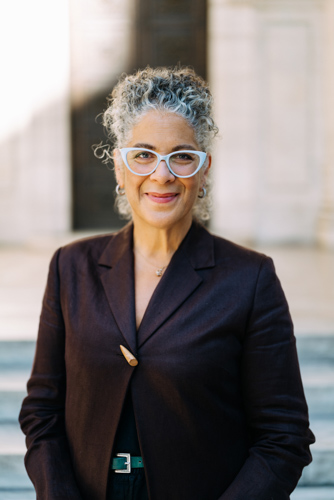About Jennifer's Work
Jennifer L. Morgan is a historian deepening understanding of how the system of race-based slavery developed in early America. Using a range of archival materials—and what is missing from them—Morgan brings to light enslaved African women’s experiences during the sixteenth and seventeenth centuries. She shows that exploitation of enslaved women was central to the economic and ideological foundations of slavery in the Atlantic world.
Morgan wrote her groundbreaking first book, Laboring Women: Reproduction and Gender in New World Slavery (2004), at a time when most scholarship focused on the transport, labor, and resistance of enslaved men. In Laboring Women, Morgan argues that enslavement was fundamentally different for women because of their reproductive potential. Enslaved women were expected to both perform agricultural fieldwork and produce children, who were born into enslavement. Morgan’s analysis of wills, probate proceedings, and purchasing records reveals how slaveowners understood forced procreation as a strategy to maintain their labor supply (rather than importing more people to enslave as laborers from Africa). In her second book, Reckoning with Slavery: Gender, Kinship, and Capitalism in the Early Black Atlantic (2021), Morgan examines the development of accounting practices that transformed enslaved people into commodities within a system of trade. She argues that such data obscured and justified the violence enslavers inflicted upon human beings. Record keepers largely left gender and parentage out of demographic and accounting records. By refusing to acknowledge kinship among enslaved people, enslavers could rationalize family separation. Morgan links the so-called neutral data of the slave trade to the consolidation of a hierarchy of race, based on false narratives about the difference and inferiority of enslaved Africans. At the same time, Morgan recovers the humanity and agency of enslaved women. She demonstrates that enslaved women understood that their captors exploited their ability to produce children to create wealth. Morgan also charts their efforts to resist the commodification of their motherhood.
Morgan is currently at work on The Eve of Slavery—a book about African women in seventeenth-century North America. It is organized around the life of Elizabeth Key, a woman of color who sued for freedom in 1656 on the grounds that her father was a free White man. The lives of Key and other Black women who tried to protect themselves and their children offer an intimate window into the development of American slavery. Morgan has established gender as pivotal to slavery’s institutionalization in colonial America, and her attention to the full ramifications of slavery for Black women sheds light on the origins of harmful stereotypes about Black kinship and families that endure to this day.












